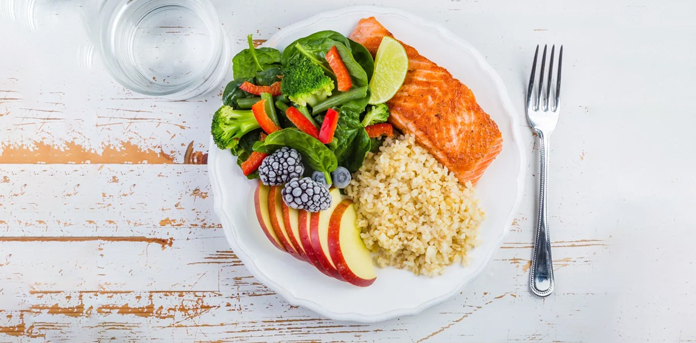Effective weight loss revolves around understanding the crucial roles of calorie intake and portion control in reaching health and fitness objectives. In the journey toward a healthier lifestyle, understanding the dynamics of calorie intake and learning the art of portion control are essential factors that define success.
Calorie Intake For Weight Loss
Our bodies need calories to function, and they serve as the basic units of energy. To lose weight, it is important to consume fewer calories than you expend. You can calculate your Basal Metabolic Rate (BMR) and Total Daily Energy Expenditure (TDEE) to understand the number of calories required to maintain your current weight. Consuming fewer calories than your TDEE makes a calorie deficit, which is essential for weight loss. This deficit pushes your body to use its stored energy (fat) to compensate for the shortage.
However, not all calories are equal. The focus should be on nutrient-dense foods that are rich in vitamins, minerals, fiber, and lean protein. These foods contribute to overall health and enhance the effectiveness of weight loss efforts. On the other hand, it is essential to steer clear of empty calories like sugary snacks and processed foods.

Importance Of Calorie Intake For Weight Loss
Understanding the importance of calorie intake in weight loss is important for anyone struggling to achieve their health and fitness goals. Here’s why calorie intake matters so significantly:
- Calories represent the energy content of the food we consume. When we consume more calories than our bodies need, the excess energy is stored in the form of fat, leading to weight gain.
- The calorie deficit pushes the body to use stored fat for energy, leading to gradual weight loss over time.
- Weight loss success relies on acquiring a balance between the calories consumed and the calories burned. If intake consistently exceeds expenditure, weight gain occurs.
- Caloric requirements differ widely based on factors such as age, gender, weight, height, activity level, and metabolism. By understanding your caloric requirements, you can tailor your eating habits to promote sustainable weight loss.
- Paying attention to calorie intake fosters mindful eating practices. Being aware of portion sizes and food choices encourages conscious decision-making, reducing the likelihood of overeating.
Portion Control For Weight Loss
Portion control is a common trap in our current food culture. Bigger plates, large restaurant portions, and extra-large packages have transformed our understanding of appropriate portions. Portion control involves consuming the right amount of food to satisfy hunger without overeating.
Embracing portion control offers multiple benefits other than weight loss. It prevents overeating, boosts mindful eating practices, and promotes better digestion. To practice portion control, simply use smaller plates and bowls, pre-portion meals and snacks, read food labels, and eat slowly to get remarkable effects.
Importance Of Portion Control For Weight Loss
The significance of portion control in a weight loss journey cannot be overstated. It is a basic strategy that has a significant influence on the success of your struggles to shed extra pounds and achieve a healthier body composition. Here’s why understanding the art of portion control is a cornerstone of effective weight loss:
- Portion control ensures that the calories consumed align with the body’s energy needs. Consuming larger portions can lead to overeating, even if the foods chosen are healthy.
- Portion control promotes mindful eating practices, enabling a deeper relationship between mind and body during meals. Eating slowly and savoring smaller portions enhances awareness of hunger and fullness cues.
- Oversized portions often lead to consuming more calories than the body requires. This surplus energy gets stored as fat, counteracting weight loss goals.
- Properly portioned meals can be visually satisfying, creating a perception of a satisfying meal even with smaller quantities.
- Balanced portion sizes help regulate blood sugar levels. Large portions, especially those high in refined carbohydrates, can lead to rapid spikes and crashes in blood sugar, promoting overeating.
- Plateaus in weight loss are often a result of a slow metabolism due to consistent caloric restriction. Portion control can prevent this by allowing for strategic adjustments without drastic decreases in caloric intake.
FAQs
Can Portion Control Lead to Balanced Eating Habits?
Absolutely. Portion control encourages mindful eating habits that go beyond weight loss. By learning to recognize hunger and fullness cues, you develop a healthier relationship with food. These habits contribute to better overall eating patterns, promoting long-term weight maintenance and a more balanced lifestyle.
Why is Calorie Intake Important for Weight Loss?
Calorie intake directly affects weight loss because it dictates whether your body gains, loses, or maintains weight. Consuming fewer calories than your body expends creates a calorie deficit, prompting the body to utilize stored fat for energy. This deficit is essential for shedding pounds effectively and achieving your weight loss goals.
How Does Portion Control Contribute to Weight Loss?
Portion control is a strategy that involves consuming controlled amounts of food during meals and snacks. By managing portion sizes, you regulate caloric intake, prevent overeating, and promote mindful eating. Proper portion control helps you stay within your calorie goals, creating a sustainable caloric deficit necessary for weight loss success.

